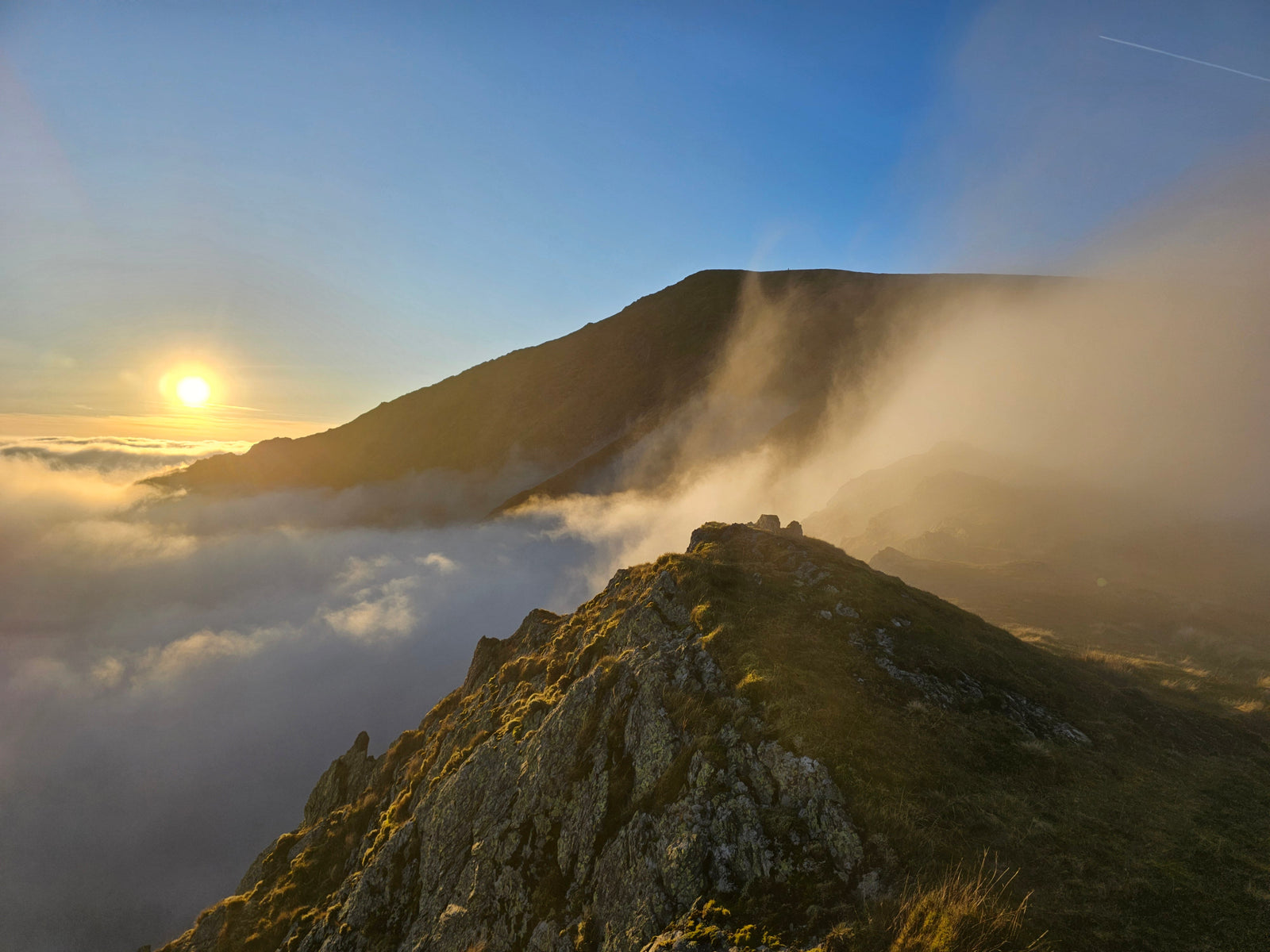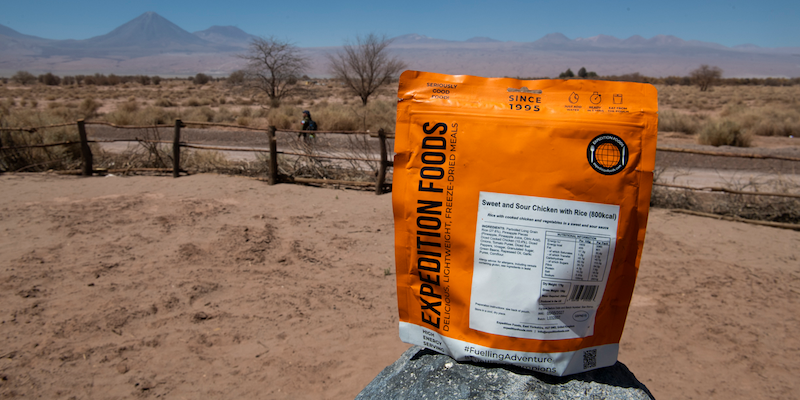-
Meals
-
Ration Packs
-
Special Diets
- Survivor Foods 25-Year Tins
-
Snacks, Drinks & Accessories
- About Us
Bikepacking with Josh Ibbett - GBDURO Winner
August 30, 2020
Bikepacking is a relatively new term for a long-standing expedition style. Bikepacking is typically accepted as being a self-supported, lightweight form of touring on a bicycle. Bikepacker bikes usually feature various bags such as a frame bag and handlebar roll.
Multi-day cycle routes can vary from shorter overnight trips to expeditions spanning hundreds or thousands of miles.
Although the Tour Divide (a 2,745- mile bike-packing race from Banff in Canada to Antelope Wells, New Mexico) really brought bike-packing to the spotlight, there have been bike-packing races of varying lengths taking place for many years.
Some of the earlier bike-packing races include the Polaris Challenge (a 2-day event combining mountain biking, orienteering, and backpacking) that started in 1991. An Expedition Foods employee said: “I remember my dad shaving a few grams off his pack weight by drilling holes through his metal cutlery set and sawing his toothbrush down to a tiny stump”.
GBDURO
The Racing Collective have their own epic bike-packing challenge, here in Britain, that began in 2019. The GBDURO links up six National Parks and three Areas of Outstanding Natural Beauty, cutting a line across the British Mountains from Land’s End to John O’ Groats. The result is a cumulative 30,000 metres of climbing.

With so many 2020 events cancelled due to the COVID-19 pandemic, The Racing Collective radically adapted the format of GBDURO, ensuring the race could still go ahead.
Changes meant that the GBDURO became a self-sufficient race (riders could have no assistance from others, no use of any buildings, and no disposal of non-biodegradable waste).
Josh Ibbett
Josh took to the new challenge of self-sufficiency with fierce determination; managing to pack everything he would carry into bike-packing bags.
Josh entered the lead at just over 1,000km into the race and managed to complete the course in 7 days, 17 hours, and 44 minutes.
We were lucky enough to be in touch with Josh when he won GBDURO and he kindly agreed to an interview.

Expedition Foods (EF): Tell me about your background, have you always been a cyclist? How did you get started?
Josh: I’ve been racing bikes since I was 14 years old, and riding mountains bikes for a few years before that. Over the years I’ve always been drawn to endurance events, gradually progressing from 12h mountain bike races to 24hour races, multi-day stage races, and gradually to bike-packing races and touring.
EF: What made you decide to enter GBDURO?
Josh: Initially in 2020 I was hoping to return to the USA for the Tour Divide, however, the global pandemic meant that all international travel plans are off the cards for the foreseeable future.
GBDuro offered the best opportunity to be able to race in 2020, however, the organisers changed the rules to make the event fully self-sufficient i.e we had to carry all the supplies for the race from the start and were not allowed to use any public facilities including buildings along the route. I think this was the responsible thing to do to minimise the amount of contact and potential transmission opportunities from riders during the event.
EF: When did you start training for the GBDURO? Can you tell us how you trained each week for the race? Realistically, how long do you think it takes to train for a multi-day bike-packing race?
Josh: I’d been training hard for Tour Divide since the start of the year so I had a good base of fitness. Once lockdown hit I stopped training as such and just rode my bike locally to keep myself sane. However, towards the end of May, it seemed likely that the event would be able to go ahead so I picked up the training.
During lockdown, I became massively busy with work as our family business was able to remain open, so this limited the amount of training I was able to do. So I focused on quality over quantity and trained around 12 hours a week.
EF: How did you prepare your nutrition for the race? Do you have a list of what you ate each day? What worked for you and what did not work for you?
Josh: I figured out that I’d need 7000 calories per day in order to perform well and spent a lot of time working out the best mix of foods to achieve this target whilst still being able to carry it all on my bike.
The core of my nutrition was 3 square meals a day and that’s where the 1000 calories Expedition Foods meals came in. I then took a bag of mixed fruit and nuts and a bag of Jelly Babies/Haribo which provided around 1000 calories each. The final 2000 calories per day were made up of RawVelo bars and myprotein cookies.
On the whole, the plan worked, although I think in future I’d probably take a few less freeze-dry meals and a few quicker to prepare lunch options instead such as wraps and tuna. The process of setting up my stove and boiling the water then waiting for the food to rehydrate wasn’t always the most time-efficient especially in a race situation, however most of the time I was grateful for the break!
EF: How did you manage to stay hydrated each day? Did you just drink water or did you add electrolytes to your drink?
Josh: We had to source all our own water, in the south of England and Wales I relied on outside taps, but further north I drank out of streams. I carried a few RawVelo electrolyte drink mixes for hotter days, but also make a habit of mixing up a bottle of Dyralyte each evening to replenish the electrolytes and make sure my body is absorbing water.
EF: We'd love to know more about the gear you brought - what was your best piece of gear and your worst piece of gear?
Josh: The best kit choice was to take a hooded rain jacket and waterproof over-shorts. This saved me in a bad storm over the Yorkshire Dales and it's amazing how much warmer you can stay with a hood up.
I don’t think I had a ‘worst’ piece of gear. I’ve refined my kit list over the years so I know exactly what I need. But I guess the thing I’d change would be my Bivvi… I took a super light hooped Bivvi, next time I think I’d go for a slightly heavier version just to make it better to sleep in during really bad weather.
EF: Was there anything that you really wanted but had to leave behind due to space constraints?
Josh: Not really, I think my kit was pretty dialled and I didn’t really miss anything.
EF: You finished first, achieving a fantastic completion time. When did you start to think you were likely to win?
Josh: There was a really bad storm in the Yorkshire Dales which caught myself and the leader at the time, Angus Young. It was pretty hit and miss as to whether I’d get hypothermia or not. Thankfully I just managed to keep warm and cooking up an Expedition Meals Porridge was a very big part of keeping the heat and energy in my body.
Unfortunately, Angus wasn’t quite as lucky and succumbed to hypothermia and pulled out the race. At the time I was aware that I’d overtaken him and was leading but it wasn’t until 24-hours later on day 5 that I actually found out he had abandoned the race. From that point on I knew the race was mine to lose and I just had to keep moving and finish to take the win.
EF: Do you have any other races planned in 2020? If there was nothing holding you back and you could enter any race, what would be your top-5 cycling races in the world?
Josh: I’m not really making any plans for the rest of the year in terms of racing. I can’t see that international travel is going to be that responsible so will hopefully go on a few UK bike-packing trips instead and race a few local Mountain Bike events if they can go ahead. My top 5 races to do would be, Tour Divide, HighlandTrail 550, Atlas Mountain Race, Colorado Trail, and the Silk Road Mountain Race.
EF: Any tips for those aspiring to do a multi-day bike-packing race?
Josh: You just need to get out there and try it. You can read all the blogs and articles you like but nothing beats the real-world experience for learning. Start with a weekender and then build up from there and work out what kit you need and more importantly what kit you don’t need to carry.
Photo Credit - @breakawaydigital
Also in Stories

In Praise of the Calorie
February 13, 2025
Norman Hadley on eating in the outdoors, and why he keeps coming back to Expedition Foods.

Jacob Myers’ Surreal Journey to Antarctica
January 23, 2025
Jacob Myers recounts his surreal journey to Antarctica, fuelled by Expedition Foods.

Government Recommended Emergency Kit
November 21, 2024


